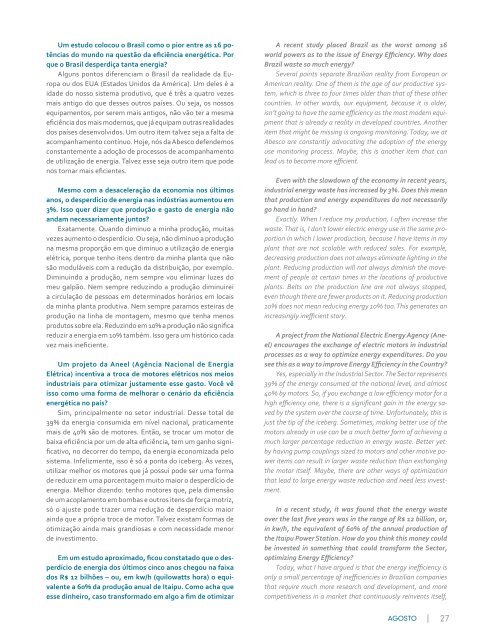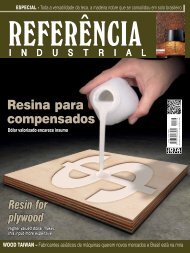Agosto/2016 - Referência Industrial 177
Visitantes - Grupo Jota Comunicação
Visitantes - Grupo Jota Comunicação
You also want an ePaper? Increase the reach of your titles
YUMPU automatically turns print PDFs into web optimized ePapers that Google loves.
Um estudo colocou o Brasil como o pior entre as 16 potências<br />
do mundo na questão da eficiência energética. Por<br />
que o Brasil desperdiça tanta energia?<br />
Alguns pontos diferenciam o Brasil da realidade da Europa<br />
ou dos EUA (Estados Unidos da América). Um deles é a<br />
idade do nosso sistema produtivo, que é três a quatro vezes<br />
mais antigo do que desses outros países. Ou seja, os nossos<br />
equipamentos, por serem mais antigos, não vão ter a mesma<br />
eficiência dos mais modernos, que já equipam outras realidades<br />
dos países desenvolvidos. Um outro item talvez seja a falta de<br />
acompanhamento contínuo. Hoje, nós da Abesco defendemos<br />
constantemente a adoção de processos de acompanhamento<br />
de utilização de energia. Talvez esse seja outro item que pode<br />
nos tornar mais eficientes.<br />
Mesmo com a desaceleração da economia nos últimos<br />
anos, o desperdício de energia nas indústrias aumentou em<br />
3%. Isso quer dizer que produção e gasto de energia não<br />
andam necessariamente juntos?<br />
Exatamente. Quando diminuo a minha produção, muitas<br />
vezes aumento o desperdício. Ou seja, não diminuo a produção<br />
na mesma proporção em que diminuo a utilização de energia<br />
elétrica, porque tenho itens dentro da minha planta que não<br />
são moduláveis com a redução da distribuição, por exemplo.<br />
Diminuindo a produção, nem sempre vou eliminar luzes do<br />
meu galpão. Nem sempre reduzindo a produção diminuirei<br />
a circulação de pessoas em determinados horários em locais<br />
da minha planta produtiva. Nem sempre paramos esteiras de<br />
produção na linha de montagem, mesmo que tenha menos<br />
produtos sobre ela. Reduzindo em 10% a produção não significa<br />
reduzir a energia em 10% também. Isso gera um histórico cada<br />
vez mais ineficiente.<br />
Um projeto da Aneel (Agência Nacional de Energia<br />
Elétrica) incentiva a troca de motores elétricos nos meios<br />
industriais para otimizar justamente esse gasto. Você vê<br />
isso como uma forma de melhorar o cenário da eficiência<br />
energética no país?<br />
Sim, principalmente no setor industrial. Desse total de<br />
39% da energia consumida em nível nacional, praticamente<br />
mais de 40% são de motores. Então, se trocar um motor de<br />
baixa eficiência por um de alta eficiência, tem um ganho significativo,<br />
no decorrer do tempo, da energia economizada pelo<br />
sistema. Infelizmente, isso é só a ponta do iceberg. Às vezes,<br />
utilizar melhor os motores que já possui pode ser uma forma<br />
de reduzir em uma porcentagem muito maior o desperdício de<br />
energia. Melhor dizendo: tenho motores que, pela dimensão<br />
de um acoplamento em bombas e outros itens de força motriz,<br />
só o ajuste pode trazer uma redução de desperdício maior<br />
ainda que a própria troca de motor. Talvez existam formas de<br />
otimização ainda mais grandiosas e com necessidade menor<br />
de investimento.<br />
Em um estudo aproximado, ficou constatado que o desperdício<br />
de energia dos últimos cinco anos chegou na faixa<br />
dos R$ 12 bilhões – ou, em kw/h (quilowatts hora) o equivalente<br />
a 60% da produção anual de Itaipu. Como acha que<br />
esse dinheiro, caso transformado em algo a fim de otimizar<br />
A recent study placed Brazil as the worst among 16<br />
world powers as to the issue of Energy Efficiency. Why does<br />
Brazil waste so much energy?<br />
Several points separate Brazilian reality from European or<br />
American reality. One of them is the age of our productive system,<br />
which is three to four times older than that of these other<br />
countries. In other words, our equipment, because it is older,<br />
isn’t going to have the same efficiency as the most modern equipment<br />
that is already a reality in developed countries. Another<br />
item that might be missing is ongoing monitoring. Today, we at<br />
Abesco are constantly advocating the adoption of the energy<br />
use monitoring process. Maybe, this is another item that can<br />
lead us to become more efficient.<br />
Even with the slowdown of the economy in recent years,<br />
industrial energy waste has increased by 3%. Does this mean<br />
that production and energy expenditures do not necessarily<br />
go hand in hand?<br />
Exactly. When I reduce my production, I often increase the<br />
waste. That is, I don't lower electric energy use in the same proportion<br />
in which I lower production, because I have items in my<br />
plant that are not scalable with reduced sales. For example,<br />
decreasing production does not always eliminate lighting in the<br />
plant. Reducing production will not always diminish the movement<br />
of people at certain times in the locations of productive<br />
plants. Belts on the production line are not always stopped,<br />
even though there are fewer products on it. Reducing production<br />
10% does not mean reducing energy 10% too. This generates an<br />
increasingly inefficient story.<br />
A project from the National Electric Energy Agency (Aneel)<br />
encourages the exchange of electric motors in industrial<br />
processes as a way to optimize energy expenditures. Do you<br />
see this as a way to improve Energy Efficiency in the Country?<br />
Yes, especially in the <strong>Industrial</strong> Sector. The Sector represents<br />
39% of the energy consumed at the national level, and almost<br />
40% by motors. So, if you exchange a low efficiency motor for a<br />
high efficiency one, there is a significant gain in the energy saved<br />
by the system over the course of time. Unfortunately, this is<br />
just the tip of the iceberg. Sometimes, making better use of the<br />
motors already in use can be a much better form of achieving a<br />
much larger percentage reduction in energy waste. Better yet:<br />
by having pump couplings sized to motors and other motive power<br />
items can result in larger waste reduction than exchanging<br />
the motor itself. Maybe, there are other ways of optimization<br />
that lead to large energy waste reduction and need less investment.<br />
In a recent study, it was found that the energy waste<br />
over the last five years was in the range of R$ 12 billion, or,<br />
in kw/h, the equivalent of 60% of the annual production of<br />
the Itaipu Power Station. How do you think this money could<br />
be invested in something that could transform the Sector,<br />
optimizing Energy Efficiency?<br />
Today, what I have argued is that the energy inefficiency is<br />
only a small percentage of inefficiencies in Brazilian companies<br />
that require much more research and development, and more<br />
competitiveness in a market that continuously reinvents itself,<br />
AGOSTO | 27

















